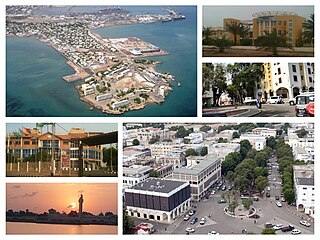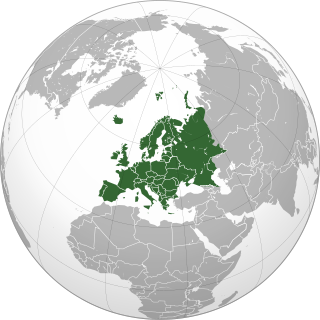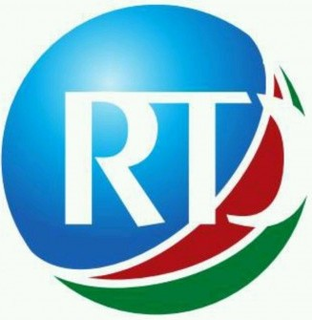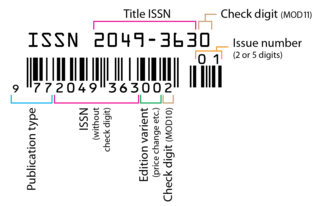
Media in Djibouti is controlled by the government.

Media in Djibouti is controlled by the government.
From Djibouti City, telephone connections are available by satellite to Europe and the West and by land line to the main cities and towns of the interior. There were 9,500 mainline telephones and 23,000 cellular phones in use throughout the country in 2003.

Djibouti City is the eponymous capital and largest city of Djibouti. It is located in the coastal Djibouti Region on the Gulf of Tadjoura.

Europe is a continent located entirely in the Northern Hemisphere and mostly in the Eastern Hemisphere. It is bordered by the Arctic Ocean to the north, the Atlantic Ocean to the west and the Mediterranean Sea to the south. It comprises the westernmost part of Eurasia.

All media are government controlled. Radio Djibouti began broadcasting in the 1940s, during the colonial period in French Somaliland. [1] In 1983, Djibouti inaugurated a powerful state-owned AM radio transmitting station, built with French and FRG funds. A television service was first introduced in 1967. Both are state run and broadcast in Arabic, French, Somali and Afar. As of 2001, there were 1 AM and 2 FM radio stations and 1 television station. In 1997, there were 77 radios and 37 television sets per 1,000 population. Internet access was available to about 6,500 subscribers in 2003.

Radio Television of Djibouti (RTD) is the national broadcaster of Djibouti.

French Somaliland was a French colony in the Horn of Africa. It existed between 1883 and 1967.

France, officially the French Republic, is a country whose territory consists of metropolitan France in Western Europe and several overseas regions and territories. The metropolitan area of France extends from the Mediterranean Sea to the English Channel and the North Sea, and from the Rhine to the Atlantic Ocean. It is bordered by Belgium, Luxembourg and Germany to the northeast, Switzerland and Italy to the east, and Andorra and Spain to the south. The overseas territories include French Guiana in South America and several islands in the Atlantic, Pacific and Indian oceans. The country's 18 integral regions span a combined area of 643,801 square kilometres (248,573 sq mi) and a total population of 67.3 million. France, a sovereign state, is a unitary semi-presidential republic with its capital in Paris, the country's largest city and main cultural and commercial centre. Other major urban areas include Lyon, Marseille, Toulouse, Bordeaux, Lille and Nice.
Djibouti has one primary weekly newspaper, the government owned La Nation de Djibouti, [2] which had a circulation of 4,300 in 2000. Each political party is allowed to publish a public journal. There are several opposition-run weeklies and monthlies that operate freely.
The constitution provides for freedom of speech and the press, but the government severely restricts journalism, and international observers say that Djibouti lacks freedom of the press. [3] [4]

Communications in Liberia include the press, radio, television, fixed and mobile telephones, and the Internet.
Telecommunications in Niger include radio, television, fixed and mobile telephones, and the Internet.
The media of Mali includes print, radio, television, and the Internet.

The media in Burkina Faso consists of print media and state-supported radio, news, and television stations, along with several private broadcasters with programs consisting of sports, music, cultural, or religious themes.
Media of Morocco includes newspapers, radio, television, and the Internet.

Media in Kenya includes more than 90 FM stations, more than 60 free to view TV stations and an unconfirmed number of print newspapers and magazines. Publications mainly use English as their primary language of communication, with some media houses employing Swahili. Vernacular or community-based languages are commonly used in broadcast media; mostly radio.
Media in Niger is a diverse collection of public and private entities, both print and broadcast, centered in the capital of Niamey, but with vibrant regional centers. The media has historically been state funded, and focused on radio broadcast media, as the nation's population is spread over great distances. Niamey boasts scores of newspapers and magazines, many of which are fiercely critical of the government. These papers though have very small circulations, and almost none outside the cities.
The Media in Angola is primarily controlled by Angola's dominant political party, the People's Movement for the Liberation of Angola (MPLA), led by José Eduardo dos Santos, the country's president.

Media in Benin was formerly controlled by the government but there has been a loosening of control since the introduction of democracy to the country in the 1990s.

Media in Burundi is controlled by the government.
Media of the Central Africa is controlled by the government.
Media in Chad is controlled by the government.

Media in the Democratic Republic of the Congo are both nationally and internationally state owned and operated.
Media in Ivory Coast is controlled by the government. Audiovisual communications are regulated by the Conseil national de la communication audiovisuelle (CNCA), an administrative arm of the national government.
The media of Gabon is primarily monitored by the Gabon government. Although the main newspapers are associated with the government, there are private broadcasters, and private weekly newspapers that are mostly controlled by opposition parties.
The media of Mauritania is undergoing a shift into a freer journalistic environment, while becoming increasingly open to private sector.
Media of the Republic of the Congo are severely restricted by many factors, including widespread illiteracy and economic underdevelopment.
Freedom of the press in Djibouti is not specifically mentioned by the country's constitution. However, Article 15 of the Constitution of Djibouti] does mention an individual's right to express their opinion "...by word, pen, or image..." and notes that "these rights may be limited by prescriptions in the law and in respect for the honour of others."
Media in Togo includes radio, television, and online and print formats. The Agence Togolaise de Presse news agency began in 1975. The Union des Journalistes Independants du Togo press association is headquartered in Lomé.
Media in Namibia includes radio, television, and online and print formats.

An International Standard Serial Number (ISSN) is an eight-digit serial number used to uniquely identify a serial publication, such as a magazine. The ISSN is especially helpful in distinguishing between serials with the same title. ISSN are used in ordering, cataloging, interlibrary loans, and other practices in connection with serial literature.
Annotated directory
The African Studies Association (ASA) is an association of scholars and professionals in the United States and Canada with an interest in the continent of Africa. Started in 1957, the ASA is the leading organization of African Studies in North America. The associations headquarters are Rutgers University in New Jersey. The ASA holds annual conferences
![]()
| This Djibouti-related article is a stub. You can help Wikipedia by expanding it. |